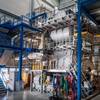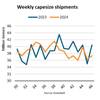By joining forces with one of the world's leading producers of Friction Stir Welded products -- Marine Aluminum of Haugesund, Norway - Williamsburg Fabricators is able to offer Friction Stir Welded aluminum in the U.S. Production is currently scheduled to begin later this year.
Marine Aluminum has supplied Friction Stir Welded material since 1997 for applications such as high speed ferry boats, rail transportation, offshore drilling platforms, helicopter decks and other industrial products. The product offers some unique properties and advantages, including no distortion or deflection, high productivity, reliable and uniform high weld quality, little pre- or post-production work, plus the higher strength of the weld.
According to the company, these advantages combine to make it possible to reduce material thickness, and therefore the weight of the final product by up to 10 to 20 percent. For marine applications, the advantages of lower weight with similar strength are obvious, as less weight equals more favorable fuel consumption, and can also lead to a more cost effective powering solution.
Williamsburg Fabricators will target the high speed ferry boat market, as well as the markets for railroad cars, truck trailers, shipping containers and other products that would benefit from lower weight with no sacrifice in strength. Although the company's primary capability is providing aluminum welding services of components for manufacturers of equipment using Friction Stir Welding, they will also offer design assistance for aluminum extrusions, anodizing, coating and modular assembly.
The project also includes the vast technical expertise and experience of ESAB. Aluminum is normally welded using MIG, TIG, plasma or manual welding with coated electrodes, and ESAB is a big manufacturer of machines and consumables for these processes. ESAB has now enlarged the product program with machines for the new welding method, Friction Stir Welding, which was developed and patented by the U.K.'s TWI.
The FSW method is based on the principle of obtaining sufficiently high temperature to forge two aluminum components, using a rotating tool, which moves along the joint. Using the FSW method, components are joined together without increasing the temperature above the melting point. It is reportedly ideal for joining straight profiles from 1.6 mm to 30 mm thick. When welding materials of more than 15 mm thickness, the welding is carried out from both sides. Maximum thickness is approximately 30 mm with 100 percent penetration.
The FSW-method has been approved by DNV, and Marine Aluminum has been issued the corresponding certificate covering the welding machine and the use of the welding method.
Featured videos

Unlock Onboard Data Efficiencies

Tracking Foreign Vessels Working in the U.S. Jones Act Market

Inmarsat Enhances Service to Drive Digitalization
Subscribe for
Maritime Reporter E-News
Maritime Reporter E-News is the maritime industry's largest circulation and most authoritative ENews Service, delivered to your Email five times per week









